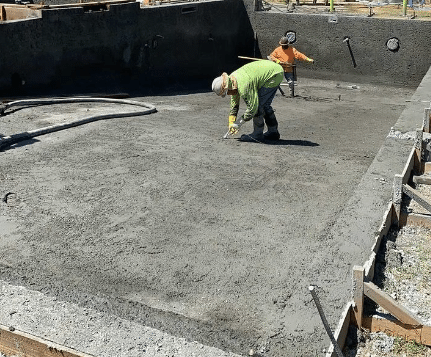Ways To Strengthen Your Failing Concrete In Imperial Beach

- Regular inspections should be conducted to identify any potential weak spots in the concrete so they can be addressed before they worsen. This includes looking for areas that appear cracked or discolored, as well as checking for signs of leakage or standing water around the foundation.
- If you do find any cracks in the concrete, it’s important to seal them quickly using a high-quality sealant. This will help prevent water and other contaminants from entering the concrete, which can lead to further weakening.
- It’s also important to reapply sealant periodically in order to keep your concrete waterproof and strong. Generally, it’s recommended that you do this every few years to ensure maximum protection from adverse weather conditions and other damaging factors.
- Adding steel reinforcements or rebar into the concrete can significantly increase its strength and longevity. If possible, consider having a professional inspect the structure first before adding in any reinforcing materials as they may not be suitable for all types of foundations.
- Moisture can be a major problem for concrete, as it weakens its structure and increases the risk of cracking. To help reduce humidity around your foundation, consider investing in a dehumidifier or installing proper ventilation systems to keep the air dry.
- Installing protective coverings such as tarps over exposed areas can help reduce the amount of wear and tear that the concrete will experience over time. This is especially important if you live in an area with extreme weather conditions like heavy rain or snowfall.
- Dirt, dust, and other debris accumulate on concrete surfaces, which can lead to deterioration over time. To prevent this from happening, make sure to clean your concrete at least once every few months. Pressure washers are an effective and easy way to get the job done quickly.
FAQ’s
How Can I Extend The Life Of My Concrete?
To extend the life of your concrete, make sure to inspect it regularly for any potential weak spots and address them quickly. Additionally, seal cracks in the concrete and reapply sealant periodically, use reinforcing materials if necessary, reduce exposure to the elements with protective coverings, and clean the surface regularly.
Is It Possible To Repair Concrete Around Pool?
Yes, it is possible to repair concrete around a pool. Concrete is a durable material commonly used for pool decks, but over time, it can develop cracks, spalling (surface deterioration), or other forms of damage due to factors such as weathering, shifting of the ground, or heavy usage. However, with the right tools, materials, and techniques, these issues can be addressed effectively. To repair concrete around a pool, the first step is to assess the extent of the damage. Small cracks can often be fixed by filling them with a concrete patching compound. This involves cleaning the crack thoroughly, applying a bonding agent to improve adhesion, and then filling the crack with the patching compound. Once the compound has cured, the surface can be smoothed and blended with the surrounding concrete. For larger cracks or areas of spalling, a process called resurfacing may be necessary. Resurfacing involves applying a thin layer of new concrete or a specialized resurfacing product over the existing damaged surface. This not only covers up the imperfections but also provides a fresh, smooth finish. The resurfacing material can be customized with different colors, patterns, or textures to enhance the aesthetics of the pool area. In addition to cracks and spalling, concrete around a pool may also suffer from discoloration or stains. Stains can be caused by various factors, including minerals in the water, leaves, or chemicals. To remove stains, there are specialized cleaning products available that can be applied to the surface. It’s important to follow the instructions carefully and test the product on a small inconspicuous area first to ensure compatibility. Regular maintenance is crucial to prevent further damage to the concrete around a pool. This includes proper cleaning, sealing, and avoiding harsh chemicals or abrasive cleaning tools that can wear down the surface. Additionally, addressing any issues promptly and considering a professional inspection can help identify potential problems early on.
How Often Should I Reseal My Concrete?
It’s generally recommended that you reseal your concrete every few years in order to keep it waterproof and strong. If you live in an area with extreme weather conditions or other damaging factors, then more frequent sealing may be necessary. It’s best to consult a professional to get an accurate recommendation on how frequently you should reseal your concrete or whether you should build new structure.
How Do I Clean Concrete?
Cleaning concrete is easy, and pressure washers are one of the most effective methods. However, you can also use a broom or scrub brush for tougher dirt and grime. Make sure to rinse the surface thoroughly afterwards with a garden hose or bucket of water. When using a pressure washer, be sure to keep it at least 12 inches away from the surface in order to avoid damaging it.
Conclusion
It is important to take action to keep your concrete strong and in good condition. Regular inspections, sealing of cracks, adding reinforcing materials, reducing exposure, and regular cleaning can all help extend the life of your concrete and prevent it from weakening prematurely in your San Diego home. For more information regarding polished concrete, concrete repair around pool or how to boost your old concrete structure with outdoor lighting and renovation contact Concrete Contractor Imperial Beach at (619) 414-1918.